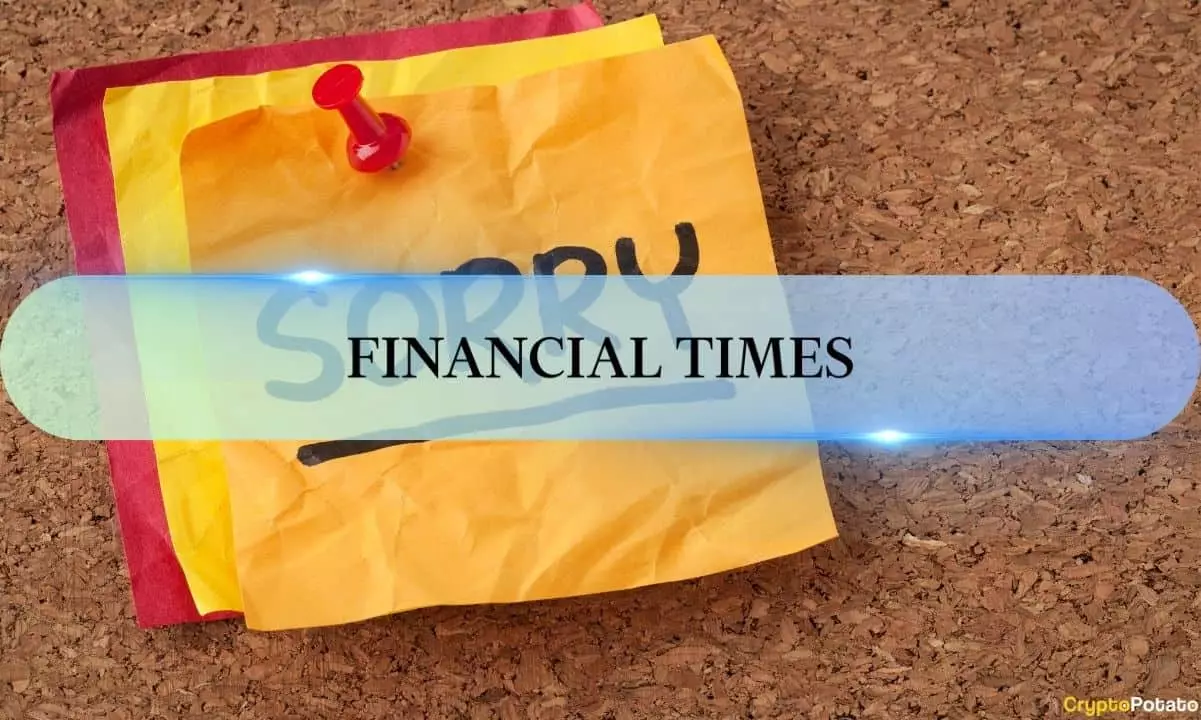On December 5, 2024, Bitcoin’s valuation astonishingly crossed the $100,000 threshold, prompting The Financial Times (FT) to issue an unusual statement framed as an “apology.” This message, disseminated via FT Alphaville, the outlet’s platform for daily commentary, was quickly met with a mixed bag of reactions, particularly from the cryptocurrency community. While it purported to acknowledge a failure of foreseeing the cryptocurrency’s meteoric rise, many stakeholders interpreted it as insincere and dripping with sarcasm.
For over a decade, the Financial Times has maintained a critical perspective on Bitcoin, which can be traced back to their very first article published on June 6, 2011. At that time, Bitcoin boasted a modest price of $15.90. Their longstanding skepticism can be broken down into several points of criticism, primarily its efficiency as a store of value and its overall utility as a financial instrument. The FT leaned heavily on characterizing Bitcoin as a “negative-sum game,” casting shadows on its legitimacy and positioning it as an investment fraught with speculative risks.
Interestingly, the latest commentary alluded to past articles which framed Bitcoin as merely an “arbitrary hype gauge,” showcasing FT’s entrenched perspective that underscores skepticism rather than acknowledgment of the asset’s evolving landscape. The apology articulated by Bryce Elder, the City Editor of FT Alphaville, attempted to couch their critical history in the softening tones of regret. Elder’s attempt to express remorse for those who refrained from investing seemed less like contrition and more of an attempt to deflect accountability, further complicating the narrative.
Content and Contextual Analysis
The structure of the FT’s apology reeked of a patronizing undertone, leading some to regard it as not a genuine mea culpa, but rather a “Cope-Pology” statement. Elder’s commentary bluntly stated, “We’re sorry if at any moment in the past 14 years you chose based on our coverage not to buy a thing whose number has gone up,” effectively twisting the apology into a sarcastic jab. This sentiment was underscored by allusions to traditional finance, which the FT claimed to disdain as much as the cryptocurrency itself.
Critics quickly seized upon the phrasing to suggest that the FT had failed to possess the humility to accept its historically poor judgment on Bitcoin’s potential. The juxtaposition of regret with a dismissal of prior criticisms elicited skepticism among ardent supporters of cryptocurrency. Given that the tone conveyed more of a mocking critique rather than a sincere regret, it prompted a wave of backlash online.
The ramifications of such an article extend beyond mere public relations for the Financial Times; they illuminate a larger discourse regarding traditional financial institutions’ views on digital assets. The article reconstructs the tension between legacy systems and emergent technologies, serving as a reminder of the chasm that exists in financial ideologies. Critics point to the FT’s enduring skepticism as an indicator of a broader reluctance within traditional finance to embrace transformative change.
Moreover, the Financial Times has a history of questioning not only the viability of Bitcoin but also of its creator, Satoshi Nakamoto. Public critiques have likened Nakamoto’s vision to a “reckless” approach, emphasizing fears that stemmed from Bitcoin’s fixed limit on supply, which some argue poses economic risks. Mark Williams, a former risk examiner at the Federal Reserve, portrayed Bitcoin as akin to therapeutic overreach, where medical interventions are dispensed without proper diagnostics.
The Financial Times’ so-called apology signals more than just a reflection on their previous stance toward Bitcoin; it exposes an essential ongoing conflict between skeptics of cryptocurrency and its fervent advocates. While the FT attempts to reconcile past judgments with the current extraordinary scenario surrounding Bitcoin’s valuation, their failure to deliver a sincere apology reflects an underlying apprehension about adapting to new financial paradigms.
As the cryptocurrency landscape continues to evolve, traditional media outlets like the Financial Times must ponder the consequences of their critical narratives and the potential emergence of irrelevance in the face of rapidly evolving financial innovations. The challenge remains: can they balance skepticism with openness to a future that increasingly looks dominated by digital assets?


Leave a Reply